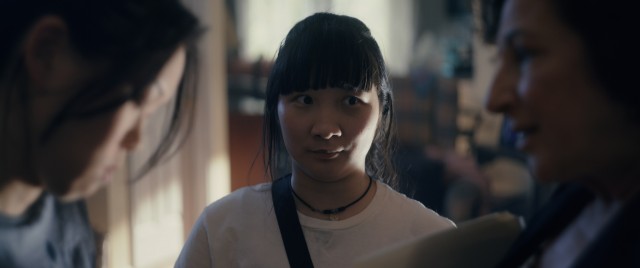The sibling relationship is a profound one. They are present during a formative period of life, and, outside of our parents, are often the most responsible for the person we turn into. Yet, for that reason, it is a complicated relationship too, and maintaining it over time, learning to adapt when necessary, does not feel like something culture puts much stock in. The self-help section of the bookstore will have hundreds of examples of how to fix your romantic relationship before you strike upon a sibling-focused book. A psychiatrist working to unpack your relationship with Mom is cliché. Your sister? Not so much.
Liz Sargent’s Sundance and SXSW featuring short, Take Me Home, gives the nuanced adult relationship of two siblings who have drifted apart center stage, but adds an additional wrinkle—the cognitive disability of one sister provides a significant hurdle to their reconciliation. Drawing from her life experience and casting her own sister in the lead role of Anna, the film is a knowing portrait of the complications of a sibling relationship when the needs of one are more than the other knows how to give.

Take Me Home stars the director’s real-life sister, Anna.
Emily is a young driven professional in New York City and has physically and psychologically moved on from her upbringing in a Texas suburb. Yet, her sister Anna, remains, dependent on their mother. Anna calls Emily when necessary, but there is a terseness to the initial phone interaction that suggests poor communication. Anna has trouble expressing herself, and Emily no longer has patience. However, Anna makes clear the gravity of the situation eventually, bursting out “My Mom is not moving!”
“Both sisters are learning how to mourn and change and compromise”
Emily flies down to handle the situation, but how much there is to handle overwhelms her—the estate, the house, the bureaucracy that controls Anna’s medications and benefits—Emily is, again, an accomplished professional, but the sheer magnitude of responsibilities and obligations overwhelm her. Yet, at no point does she enlist Anna’s help, or Anna’s potential expertise in managing her own life, which she has participated in for years. Describing the central conflict of the film to us, Sargent relays that, “Anna must find a way to communicate her self-agency while her sister overhauls her home. Both sisters are learning how to mourn and change and compromise. And the only way they can move forward is if they can understand each other, but Anna’s verbal skills are not fully developed. How can they transcend language?”
Beautifully shot by DP Minos Papas, with a soft, lyrical look, what struck me most about Take Me Home from a storytelling perspective is the gentle and intuitive way Sargent, alongside her editor, Ashley Roby, elide time. The plot of the film requires a lot of novel information to be communicated, while the relationship arc of the characters is slow and gradual. The rhythm of the film finds a pleasing middle ground by avoiding both dramatic expository scenes and montage sequences. Instead, there is a softness to the edges of scenes or interactions that flow into one another without a clear sense of time elapsed.
“The scenes were devised in structured improv so that we hit the emotional beats, but Anna was always in control.”
It is fascinating to think about how the casting of her sister, Anna Sargent, in the lead role contributes to this unique feel of the film. In talking to Liz it is clear that proving a disabled actor could carry a lead role was a major motivation behind the film, and while Anna provides the film with necessary authenticity, her disability did need to be actively accounted for on set, as her cognitive condition leaves her with little short-term memory. However, Liz tells us, “This film could only be made with my sister Anna, whom I know well enough to work with intimately and create creative space for,” and “The scenes were devised in structured improv so that we hit the emotional beats, but Anna was always in control.”
The result is a film that, by centering Anna’s performance, feels unlike any other in our catalog of official selections. The rhythms and nuances of Anna’s mind and communication style are authentically preserved and the result is fascinating. Liz hopes that her approach to actor direction will be held up as an example and provide an “innovative and progressive way to think about disability accessibility and representation on the screen.” The film is off to a good start, with a celebrated festival run and inclusion in the 2023 Sundance Film Festival Short Film Tour. Having qualified for Oscar contention, we’re pleased to highlight this remarkable work as part of our award-season coverage.

 Jason Sondhi
Jason Sondhi